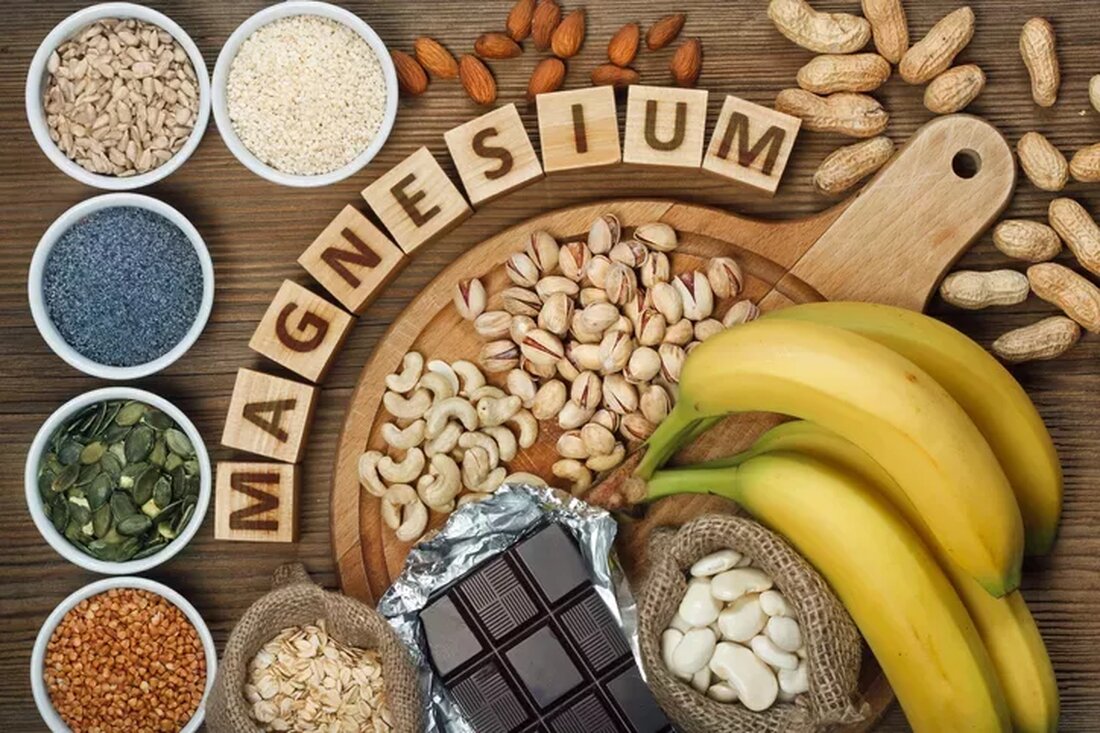25 Magnesium-Rich Foods That Can Lower Your Risk of Anxiety, Depression, Heart Attacks, and More
Magnesium is an essential mineral that plays an important role in human health. While it is responsible for over 600 functions in the body – including energy metabolism and the formation of proteins – experts estimate that around 50% of people are deficient. Because it plays an important role in immune response, bone health, muscle performance, blood sugar regulation and many other functions, it is important that you have enough magnesium. The good news is that there are a variety of foods rich in magnesium. By including these in your diet, you can ensure that you...

25 Magnesium-Rich Foods That Can Lower Your Risk of Anxiety, Depression, Heart Attacks, and More
Magnesium is an essential mineral that plays an important role in human health. While it is responsible for over 600 functions in the body – including energy metabolism and the formation of proteins – experts estimate that around 50% of people are deficient. Because it plays an important role in immune response, bone health, muscle performance, blood sugar regulation and many other functions, it is important that you have enough magnesium.
The good news is that there are a variety of foods rich in magnesium. By including these in your diet, you can ensure that you stay away from the various consequences that can arise from magnesium deficiency. Although supplements are available, it is easiest to get the recommended daily value from fresh fruits, vegetables, fish and nuts.
Why your body needs magnesium
Every cell in the body contains magnesium. While this includes muscle, blood, and soft tissue, 60% of the magnesium in your body is found in your bones. It is important for preventing a variety of health conditions including osteoporosis, inflammatory diseases, metabolic syndrome and diabetes.
Since this mineral plays a key role in many internal processes, problems such as insulin resistance, PMS, migraines, obesity, diabetes and depression can be improved with increasing intake. For example, one study tested magnesium supplementation in people with type 2 diabetes. The results showed that those who received the supplement improved their insulin sensitivity and metabolic control.
35 foods high in magnesium
While supplements are an option, you can easily get enough magnesium through your diet. By including foods on the list below, you will ensure you are giving your body everything it needs to function optimally. The recommended daily dose is 400-420 mg per day for men and 310-320 mg for women.
Top 15 Foods Highest in Magnesium:
- Hanfsamen: Portionsgröße 1/4 Tasse, 272 mg Magnesiumgehalt
- Kürbiskern – Körner: Portionsgröße 28g, 168 mg Magnesiumgehalt
- Sonnenblumenkerne: Portionsgröße 1/4 Tasse, 113 mg Magnesiumgehalt
- Mangold, gekocht: Portionsgröße 1/2 Tasse, 86mg Magnesiumgehalt
- Mandeln, trocken geröstet: Portionsgröße 28g, 80 mg Magnesiumgehalt
- Spinat, gekocht: Portionsgröße ½ Tasse, 78 mg Magnesiumgehalt
- Cashewnüsse, trocken geröstet: Portionsgröße 28g, 74 mg Magnesiumgehalt
- Kürbiskerne in der Schale: Portionsgröße 28g, 74 mg Magnesiumgehalt
- Erdnüsse, Öl geröstet: Portionsgröße ¼ Tasse, 63 mg Magnesiumgehalt
- Getreide, Weizenschnitzel: Portion Größe 2 große Kekse, 61 mg Magnesiumgehalt
- Sojamilch, normal oder Vanille: Portionsgröße 1 Tasse, 61 mg Magnesiumgehalt
- Schwarze Bohnen, gekocht: Portionsgröße ½ Tasse, 60 mg Magnesiumgehalt
- Edamame, geschält, gekocht: Portionsgröße ½ Tasse, 50 mg Magnesiumgehalt
- Dunkle Schokolade (60-69% Kakao): Portionsgröße 28g, 50 mg Magnesiumgehalt
- Erdnussbutter, glatt: Portionsgröße 2 Esslöffel, 49 mg Magnesiumgehalt
Additional sources of magnesium:
- Brot, Vollkornbrot: Portionsscheiben der Größe 2, 46 mg Magnesiumgehalt
- Avocado, gewürfelt: Portionsgröße 1 Tasse, 44 mg Magnesiumgehalt
- Mit Haut gebackene Kartoffel: 43 mg Magnesiumgehalt
- Reis, braun, gekocht: Portionsgröße ½ Tasse, 42 mg Magnesiumgehalt
- Joghurt, normal, fettarm: Portionsgröße 220g, 42 mg Magnesiumgehalt
- Angereicherte Frühstückszerealien: Portionsgröße 10% Anreicherung, 40 mg Magnesiumgehalt
- Haferflocken, sofort: Portionspackung Größe 1, 36 mg Magnesiumgehalt
- Kidneybohnen, in Dosen: Portionsgröße ½ Tasse, 35 mg Magnesiumgehalt
- Banane: Portionsgröße 1 Medium, 32 mg Magnesiumgehalt
- Kakaopulver – ungesüßt: Portion Größe 1 Esslöffel, 27 mg Magnesiumgehalt
- Lachs, Atlantik, gezüchtet: Portionsgröße 84g, 26 mg Magnesiumgehalt
- Milch: Portionsgröße 1 Tasse, 24–27 mg Magnesiumgehalt
- Heilbutt, gekocht: Portionsgröße 84g, 24 mg Magnesiumgehalt
- Rosinen: Portionsgröße ½ Tasse, 23 mg Magnesiumgehalt
- Hühnerbrust, geröstet: Portionsgröße 84g, 22 mg Magnesiumgehalt
- Rindfleisch, gemahlen, 90% mager: Portionsgröße 84g, 20 mg Magnesiumgehalt
- Brokkoli, gehackt und gekocht: Portionsgröße ½ Tasse, 12 mg Magnesiumgehalt
- Reis, weiß, gekocht: Portionsgröße ½ Tasse, 10 mg Magnesiumgehalt
- Apfel: Portionsgröße 1 mittel, 9 mg Magnesiumgehalt
- Karotte, roh: Portionsgröße 1 mittel, 7 mg Magnesiumgehalt
Sources:
- https://pubmed.ncbi.nlm.nih.gov/25540137/
- https://pubmed.ncbi.nlm.nih.gov/28140318/
- https://www.healthline.com/nutrition/10-proven-magnesium-benefits
- https://pubmed.ncbi.nlm.nih.gov/12663588/
- https://my.clevelandclinic.org/health/articles/15650-magnesium-rich-food

 Suche
Suche
 Mein Konto
Mein Konto
